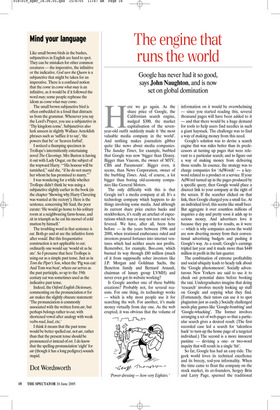Mind your language
Like small brown birds in the bushes, subjunctives in English are hard to spot. They can be mistaken for other common creatures — the imperative, the infinitive or the indicative. God save the Queen is a subjunctive that might be taken for an imperative. There is a confused notion that the come in come what may is an infinitive, as it would be if it followed the word may; some people rephrase the idiom as come what may come.
The small brown subjunctive bird is often embedded in a fossil that distracts us from the grammar. Whenever you say the Lord’s Prayer, you use a subjunctive in ‘Thy kingdom come’. Subjunctives also lurk unseen in slightly Wallace Arnoldish phrases such as ‘suffice it to say’, ‘the powers that be’ or ‘heaven forbid’.
I noticed a thumping specimen in Trollope’s intermittently entertaining novel The Claverings. Mrs Burton is having it out with Lady Ongar, on the subject of the wayward Harry. ‘“His honour will be tarnished,” said she, “if he do not marry her whom he has promised to marry.”’ I was wondering for a while whether Trollope didn’t think he was using a subjunctive slightly earlier in the book (in the chapter ‘Showing why Harry Clavering was wanted at the rectory’). Here is the sentence, concerning Mr Saul, the poor curate: ‘He would go home to his solitary room at a neighbouring farm-house, and sit in triumph as he eat his morsel of cold mutton by himself.’ The troubling word in that sentence is eat. Both go and sit are the infinitive form after would. But this frequentative construction is not applicable to eat; ordinarily one would say ‘would sit as he ate’. So I presume that here Trollope is using eat as a simple past tense. Just as in Tom the Piper’s Son, when the ‘Pig was eat/ And Tom was beat’, where eat serves as the past participle, so up to the 19th century eat was sometimes used as the indicative past tense.
Indeed, the Oxford English Dictionary, commenting on the pronunciation et for ate makes the slightly obscure statement: ‘The pronunciation is commonly associated with the written form ate, but perhaps belongs rather to eat, with shortened vowel after analogy with weak verbs read, lead, etc.’ I think it means that the past tense would be better spelled eat, not ate, rather than that the present tense should be pronounced et instead of eet. I do know that the spelling-pronunciation ‘eight’ for ate (though it has a long pedigree) sounds stupid.
















































 Previous page
Previous page